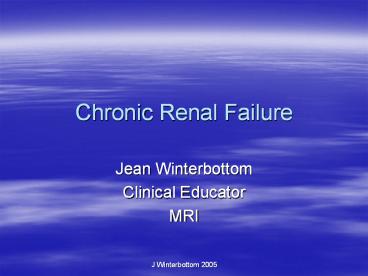Chronic Renal Failure - PowerPoint PPT Presentation
Title:
Chronic Renal Failure
Description:
Title: Pathophysiology- Progression from CRF to ESRF Author: Georgina Follows Last modified by----- Created Date: 1/8/2005 9:05:24 PM Document presentation format – PowerPoint PPT presentation
Number of Views:454
Avg rating:3.0/5.0
Title: Chronic Renal Failure
1
Chronic Renal Failure
- Jean Winterbottom
- Clinical Educator
- MRI
2
Clarification of Terminology
- What do you understand by the following terms
- Chronic Renal Failure
- Damage to kidneys but treatment is not necessary
- End Stage Renal Failure
- Long term damage requiring renal replacement
therapy 90-95 nephrons not functioning - Acute Renal Failure
- Sudden decline in renal function at least 50
decrease in GFR - 50 patients recover others go on to CRF
- Acute on Chronic Renal Failure
- Acute episode which may require treatment then
revert back to chronic, however the patient may
then have reached end stage
3
Common causes of Chronic Renal Failure
- Glomerulonephritis 25
- Diabetes Mellitus 25
- Hypertension 10
- Chronic pylonephritis/reflux 10
- Polycystic kidney disease 10
- Interstitial nephritis 5
- Obstruction 3
- Unknown 12
4
Obesity
- Increase in obesity caused by
- Change in western diet
- Fast food
- High in sodium
- High in saturated fat
- Causes
- Hypertension
- Type 2 Diabetes
5
(No Transcript)
6
(No Transcript)
7
Hypertension
- 3rd highest contributor to end stage renal
failure programmes - Causes
- Filtration failure, causing intravascular volume
expansion - Renal artery stenosis,
- Until BP extremely elevated patient will not
experience symptoms - Need to adhere to anti-hypertensive medication to
keep within normal parameters (RA guidelines
130/80)
8
(No Transcript)
9
Type 2 Diabetes
- Sharp increase in people with Type 2 Diabetes due
to obesity - Poor control of glucose levels in blood
- Causes damage to kidney tissue
- Increase in projected numbers needing dialysis
through Diabetic Nephropathy
10
Classification of Renal Failure
- Early referral
- Delay may be caused by sudden onset of ureamic
symptoms - Many patients have already progressed to ESRF
when identified - Once referred investigations are carried out to
determine progress of disease
11
Diagnostics Tests
- Renal Ultrasound
- Obstruction in urinary collecting system
- Number,size symmetry of kidneys
- Bladder Xray
- Calculi, tumours cysts
- Renal Biopsy
- Determine extent of pathology, last resort
12
Recognizing Clues
- Protein in urine
- Elevated biochemistry results i.e.
- Creatinine
- Urea
- Potassium
- Anaemia from decreased RBC production shortened
RBC survival
13
Recognizing Clues (2)
- Uraemia symptoms
- Bad breath (urinous,ammonia)
- Oedema (eyes, face, arms,hands, feet)
- Hypertension
- Extended neck veins
- Fatigue (anaemia,toxic substances)
- Neurological disturbances (lethargy,
confusion,sleep disorders)
14
Recognizing Clues (3)
- Nausea vomiting
- Headaches
- Pruritus (phosphate, calcium, aluminium)
- Breathlessness
- Bone joint problems (calcium/phosphate
imbalances,VitD deficiency,demineralization) - Bone pain
15
Management of chronic renal failure
- Determine and treat cause
- Optimise salt and water balance
- Identify appropriate dietary advice
- Control hypertension
- Control electrolyte imbalance
- Prevent and treat renal bone disease
- Early detection and treatment of infection
- Modify drug therapy inline with decline in renal
function - Detect and treat any complications
- Prepare for dialysis and transplant programme
16
Treating ESRD
- 4 forms of treatment
- HAEMODIALYSIS
- PERITONEAL DIALYSIS (CAPD)
- TRANSPLANTATION
- CONSERVATIVE
17
Emotional Support
- Realisation that there is no cure can trigger
- Anxiety
- Denial
- Frustration
- Anger
- Depression
- Hopelessness
18
Emotional Support (2)
- No specialized nurse counsellor
- Renal nurse must provide patient and families
with - Education
- Compassion
- Understanding
- So that they can manage treatment effectively
19
Scenario
- A diabetic patient arrives on your ward. He has a
history of running high blood glucose levels.
What would indicate that he had renal impairment?































